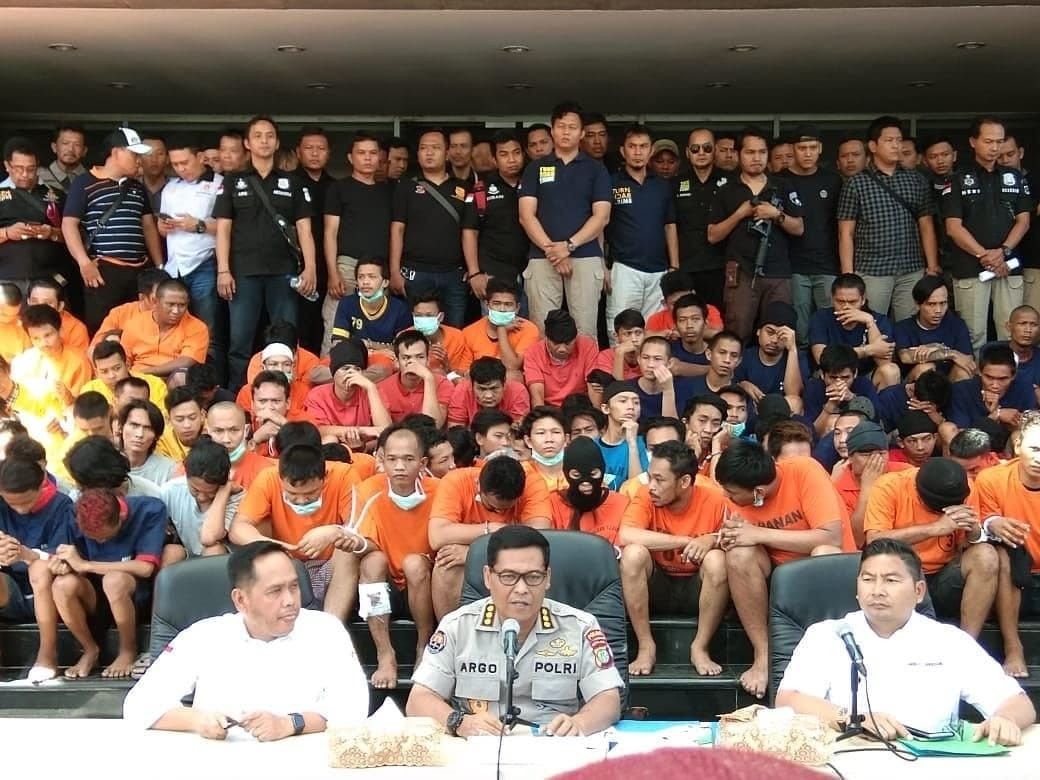News
‘Premanisme’ part of Indonesia’s business landscape, small or large
Tenggara Strategics May 28, 2025 Jakarta Police show suspects of various street crimes arrested during a special operation ahead of the 18th Asian Games. (Jakarta Police's documentation/-)
Jakarta Police show suspects of various street crimes arrested during a special operation ahead of the 18th Asian Games. (Jakarta Police's documentation/-)
The National Police have launched a massive crackdown on preman (thugs), following a series of high-profile cases of violence and extortion linked to them that embarrassed the country in the eyes of foreign investors. While some of those arrested will face prosecution, it is unlikely that the larger organizations behind them will be dissolved as President Prabowo Subianto has ordered.
Police said this week that they had rounded up 2,406 alleged preman in an 11-day operation in Jakarta alone, though only 231 were slated to face a court trial. The rest would be freed for lack of sufficient evidence. Police in other regions also reported arrests, the majority over alleged extortion, but others for violence, illegal debt collecting, muggings, theft, and possession of a weapon.
We have seen many similar campaigns in the past to know that things on the ground aren’t likely to change. Those arrested are small-time crooks, usually running protection rackets in markets and managing parking lots, mostly targeting small-scale traders but also motorists at times. They will lay low for now, and once the police clampdown ends, they will return and things will go back to “normal”.
Many thugs are part of legitimate mass organizations registered with the Home Ministry, however, making it hard for the government to disband them.
These groups are mostly militias with large memberships, some easily recognizable by their uniforms. They gain legitimacy from offering various services, such as providing supplementary support to police in securing big gatherings like political rallies and working as debt collectors for companies or individuals. Some enjoy the patronage of powerful politicians, political parties, and even the police, the military, or local administrations.
Notoriety is part of their public persona, so few dare to challenge or report, let alone fight, them. They have no qualms at being labeled preman, which derives from the Dutch term vrijman, meaning “freeman” and referred to colonial subjects not tied to any contract or bond. It evolved over the centuries, and it now refers to people outside the law.
One preman group that has recently attracted public attention is the United Indonesian People’s Movement (GRIB Jaya), founded in 2012 by Rosario “Hercules” Marshal, over a series of brushes with the law.
In April, the group closed a factory in South Barito, Central Kalimantan, to collect a payment on behalf of a local rubber supplier who had won a court case. That same month, GRIB Jaya members set fire to three police cars in Depok, West Java, after a local leader was picked up for questioning, apparently for making threats against officers.
There have also been reports of GRIB Jaya members clashing with those of Pemuda Pancasila, another group that ruled during the Soeharto era but gradually lost its territorial clout in gang wars with newcomers, including GRIB Jaya.
At one time, the group listed Prabowo Subianto as its chief patron, although his office said the President had relinquished that position long ago. Hercules, who comes from East Timor (now Timor-Leste), was a member of a pro-Indonesia militia in the 1980s when he first met Prabowo, who was then a young Army officer.
But it was not the series of violence linked to GRIB Jaya that triggered the latest police action on preman. Instead, two cases of extortion targeting Chinese investments that came to light prompted the President to order a crackdown, even suggesting that preman groups causing public unrest should be dissolved.
The first case emerged in a report in the South China Morning Post that bore the screaming headline “Indonesia seen as a gangster state” in its print edition and the longer “Indonesia’s EV revolution held hostage by ‘preman’ gangster problem” in its digital edition. The article refers to a series of extortion schemes targeting suppliers of an electric vehicle factory currently being developed by leading Chinese carmaker BYD in Subang, West Java. It also mentions other foreign investments in Indonesia that are being targeted by preman.
The second case targeted another Chinese company operating in West Java, this one as a contractor in the steel town of Cilegon and implicated the powerful Indonesian Chamber of Commerce and Industry (Kadin). In a video clip that has since gone viral, the chair of Kadin’s Cilegon chapter is seen demanding a Rp 5 trillion (US$312 million) project from the Chinese company. Kadin has since expelled the man.
And that’s probably the most that Indonesian authorities can do in terms of controlling preman: go after individuals, not the organizations behind them.
Dissolving preman groups is not unprecedented, however. In 2020, then-president Joko “Jokowi” Widodo banned the Islam Defenders Front (FPI), a hard-line, anti-government group notorious for terrorizing bars, hotels and places of worship in the name of Islam. It was not banned for its activities, however, but for not adopting state ideology Pancasila as its foundational principle as mandated by the Law on Mass Organizations.
If the government doesn’t take the drastic decision to ban some of the more problematic preman groups, the issue will likely remain after the police campaign is over. After all, premanisme (gang activity) is and has always been part of Indonesia’s business landscape for all entities, big or small.
What we've heard
An investigation involving various sources revealed that one of the suspects in the extortion of PT Chandra Asri Alkali (CAA), Ismatullah, has served as a member of the Cilegon regional legislative council from the Golkar Party.

